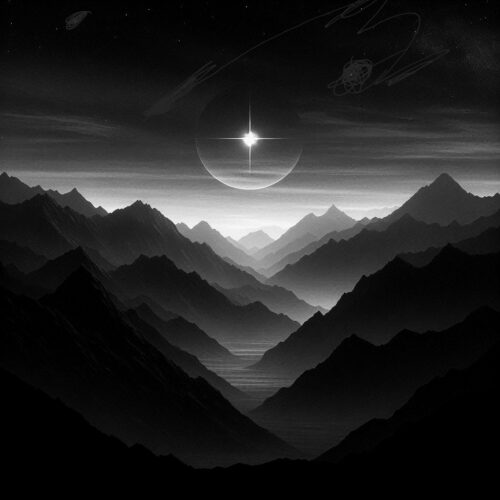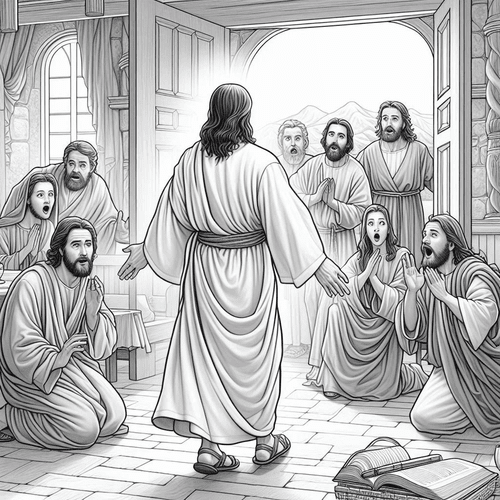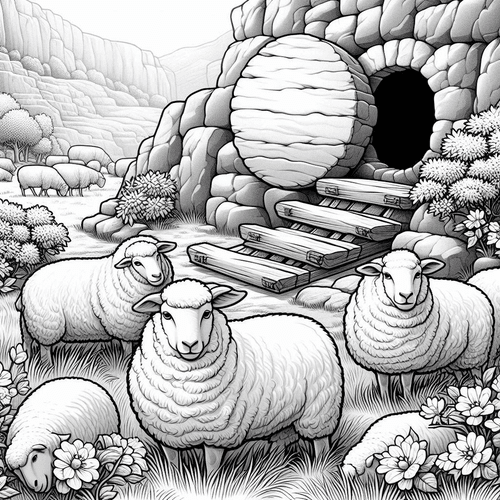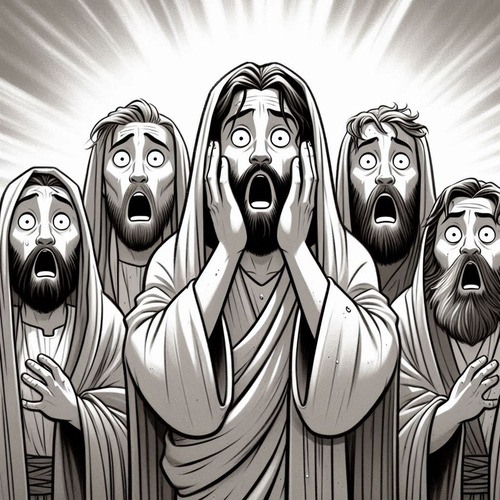What Does It Mean That Christ Is Our Morning Star?
HERALD OF GOD’S NEW DAWN
In the final chapter of Scripture, Jesus makes a profound declaration about His identity: “I am the root and the descendant of David, the bright morning star” (Revelation 22:16). The self-revelation, coming at the close of Bible revelation, draws together threads of prophecy and promise that span the entire narrative of Scripture. But what does it mean for Jesus to identify Himself as the morning star?
The morning star—the planet Venus—is the brightest celestial object in the pre-dawn sky. It heralds the approaching day, appearing at its most brilliant when the night is darkest, just before sunrise.
Yet when Jesus claims this title, He transforms what was once merely a beautiful metaphor into a profound theological reality. The morning star isn’t just a symbol of hope—Jesus is Himself the hope of all creation, the one who breaks through our spiritual darkness and heralds the dawn of God’s new day.
BIBLICAL FOUNDATION FOR THE MORNING STAR IMAGERY
Old Testament Prophecies
The concept of the morning star in Scripture begins in Numbers 24:17. The pagan prophet Balaam, despite his own spiritual darkness, is compelled to prophesy: “A star shall come out of Jacob, and a sceptre shall rise out of Israel.” The messianic prophecy linked the imagery of a star with the coming king who’d rule God’s people.
Isaiah’s prophecy adds fresh detail. In Isaiah 60:1-3, we read, “Arise, shine, for your light has come, and the glory of the LORD has risen upon you. For behold, darkness shall cover the earth, and thick darkness the peoples; but the LORD will arise upon you, and his glory will be seen upon you.” While not explicitly mentioning the morning star, the text establishes the theological framework of divine light piercing through spiritual darkness.
The prophet Malachi provides perhaps the most vivid Old Testament anticipation of Christ as morning star in his prophecy about the “sun of righteousness” who will “rise with healing in its wings” (Malachi 4:2). The metaphor bridges the gap between the star imagery and its ultimate fulfillment in Christ’s role as the bearer of spiritual healing and righteousness.
New Testament Fulfillment
The New Testament brings these prophetic threads to their culmination in Christ. Peter, writing to believers facing persecution and doubt, reminds them to pay attention to the prophetic word “as to a lamp shining in a dark place, until the day dawns and the morning star rises in your hearts” (2 Peter 1:19). This passage beautifully connects the objective reality of Christ as the morning star with the subjective experience of His light dawning in the hearts of believers.
In Revelation 2:28, Christ promises to give “the morning star” to those who overcome and keep His works until the end. The promise takes on deeper meaning when connected with His later self-identification as the morning star in Revelation 22:16. Christ doesn’t merely give His people a symbol—He gives them Himself, the true Morning Star.
What begins as prophetic imagery in the Old Testament finds its complete fulfillment in the person and work of Christ. He isn’t simply like a morning star; He is the Morning Star, the one whose coming heralds not just a new day but a new creation, bringing light to those dwelling in darkness and the shadow of death.
THEOLOGICAL SIGNIFICANCE IN REFORMED THOUGHT
- Christ—Herald of the New Creation: Christ’s role as Morning Star points to more than individual salvation—it heralds the dawn of new creation itself. As the Morning Star appears when darkness is deepest, Christ’s first advent came in the fullness of time, when humanity’s need was greatest. Yet this imagery points forward to His second coming, when the new creation will be fully realised. As Morning Star, He announces the approaching day when—as the Belgic Confession affirms—all things will be made new. This renewal encompasses the entire created order.
- Sovereign Grace in Illumination: Spiritual darkness isn’t merely ignorance but spiritual blindness resulting from the Fall. As the morning star cannot be seen by closed eyes, so Christ’s light isn’t perceived by the natural person. It requires sovereign grace—what Reformed theology calls “illumination”—for sinners to recognise Christ as the Morning Star. The illumination is entirely the work of God’s Spirit, who opens blind eyes and causes the light of Christ to dawn in darkened hearts.
- Assurance of Final Victory: The morning star’s appearance provides absolute certainty of approaching dawn. Similarly, Christ’s presence as Morning Star offers believers unshakeable assurance of final victory. Our assurance rests not on human faithfulness but on Christ’s finished work and continuing intercession. This provides particular comfort to believers facing persecution or doubt. As Calvin noted, though the night may seem endless, the Morning Star’s presence guarantees the coming day. This assurance is grounded in God’s sovereign faithfulness rather than human performance.
PRACTICAL APPLICATIONS FOR BELIEVERS
- Present Hope in Darkness: Knowing Christ is our Morning Star provides profound comfort in present darkness. Whether facing personal trials, societal decline, or spiritual warfare, we can take heart the Morning Star’s presence guarantees the approaching dawn. The darker the night, the more visible the morning star becomes. Similarly, Christ’s light often shines most clearly in our darkest moments.
- Anticipation of Christ’s Return: Christ’s identity as Morning Star creates in believers a proper orientation toward the future. We live as those who’ve seen the first light of dawn and eagerly await the full day. This “already/not yet” tension shapes Christian living: we have the Morning Star now, yet await the full sunrise of Christ’s return. This anticipation produces both patience and urgency. We watch and work with confident hope, knowing the Day approaches at God’s appointed time.
- Daily Walking in His Light: The present reality of Christ as Morning Star has immediate implications for daily living. As those upon whom the light has dawned, we’re called to walk as children of light (Ephesians 5:8). This involves both putting off works of darkness and actively pursuing holiness. This sanctification isn’t achieved through mere moral effort but through fixing our gaze on Christ, the Morning Star. As we behold Him, we’re transformed. This reflects the Reformed emphasis on grace-driven effort in sanctification.
CONCLUSION
Christ’s identity as the Morning Star reveals His role in both creation and new creation. He’s the herald of God’s approaching day, the guarantor of final victory, and the present help in darkness. This reality transforms how we view our present circumstances and future hope.
As those who’ve seen the Morning Star, believers are called to both witness and wait. We testify to the light that has dawned while eagerly anticipating the full day. This creates in us a peculiar perspective: we remain sober about present darkness while maintaining unshakeable hope in the approaching dawn.
CHRIST IS OUR MORNING STAR—RELATED FAQs
How do we reconcile Isaiah 14:12’s reference to Lucifer as “morning star” with Jesus being the “bright Morning Star”? The Hebrew term helel (translated as Lucifer in Latin) refers to a “shining one” and was used to mock the king of Babylon’s failed attempt to usurp God’s glory. Satan, like the earthly king of Babylon, attempted to grasp divine glory through pride, while Christ, the true Morning Star, obtained it through humble obedience. This contrast highlights the difference between counterfeit and authentic divine glory.
Does Venus being a “false star” (actually a planet) affect the theological meaning of Jesus as the Morning Star? The fact that Venus is a planet reflecting the sun’s light actually enriches the metaphor, as it points to Christ’s role in reflecting the Father’s glory (Hebrews 1:3). Just as Venus heralds the sun’s coming, Christ both reflects and heralds the Father’s glory, though in His case, He is also the source of that glory as the Second Person of the Trinity.
How does Jesus as Morning Star relate to other celestial imagery in Scripture, like “Sun of Righteousness”? These various celestial images reveal different aspects of Christ’s work and person: as Morning Star, He heralds the new day; as Sun of Righteousness, He brings that day in its fullness. This progression shows both Christ’s role in anticipation (Morning Star) and fulfillment (Sun), while maintaining His deity in both roles.
Did the early church see any significance in Jesus choosing this title as His final self-revelation in Scripture? Early church fathers like Augustine saw profound significance in Christ closing Scripture with this title, viewing it as a bookend to Genesis 1:3’s “Let there be light.” They saw it as Christ declaring Himself both the initiator of the first creation and the herald of the new creation, thus encompassing all of redemptive history.
How does the Morning Star imagery relate to Christ’s role as Prophet, Priest, and King? As Morning Star, Christ fulfils all three offices: prophetically announcing the coming day, priestly guiding His people through the darkness, and royally ruling over the transition from night to day. This threefold aspect shows how the Morning Star imagery integrates with other major theological frameworks about Christ’s work.
Is there any connection between Christ as Morning Star and the star of Bethlehem? While distinct phenomena, both serve as divine signs pointing to Christ’s advent: the star of Bethlehem guided people to His first coming, while the Morning Star imagery points to both His present reign and future return. Together, they bracket Christ’s work from incarnation to consummation, showing how God uses celestial signs to mark key moments in redemptive history.
Does the Morning Star imagery have any implications for Christian worship timing, such as Easter sunrise services? Early Christians often met before dawn, partly inspired by the Morning Star imagery and Christ’s resurrection “early on the first day.” While not prescriptive, this historical practice reminds us that Christian worship anticipates and celebrates the transition from darkness to light, both literally and spiritually.
CHRIST IS OUR MORNING STAR—OUR RELATED POSTS
Editor's Pick
SUPPORT US:
Feel the Holy Spirit's gentle nudge to partner with us?
Donate Online:
Account Name: TRUTHS TO DIE FOR FOUNDATION
Account Number: 10243565459
Bank IFSC: IDFB0043391
Bank Name: IDFC FIRST BANK






